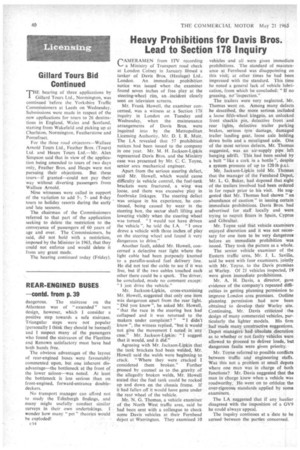Heavy Prohibitions for Davis Bros.
Page 42

If you've noticed an error in this article please click here to report it so we can fix it.
Lead to Section 178 Inquiry
CAMERAMEN from 11V recording a Ministry of Transport road check at London Colney in January filmed a tanker of Davis Bros. (Haulage) Ltd.. London. An immediate prohibition notice was issued when the examiner found seven inches of free play at the steering-wheel rim, an -incident clearly seen on television screens.
Mr. Frank Howell, the examiner concerned, was a witness at a Section 178 inquiry in London on Tuesday and Wednesday, when the maintenance arrangements of Davis Bros. were inquired into by the Metropolitan Licensing Authority, Mr. D. I. R. Muir. The LA revealed that 57 prohibition notices had been issued to the company in one year. Mr. M. 11. Jackson-Lipkin represented Davis Bros. and the Ministry case was presented by Mr. C. C. Toyne, senior area mechanical engineer.
Apart from the serious steering defect, said Mr. Howell, which would cause difficulty in vehicle control, the fuel-tank brackets were fractured, a wing was loose, and there was excessive play in footbrake linkages. The steering defect was unique in his experience, he continued, being caused by wear in the steering box, the sector shaft lifting and lowering visibly when the steering wheel was turned. "I would not have driven the vehicle ", he told the IA. "11 once drove a vehicle with three inches of play on the steering wheel and found it very dangerous to drive."
Another fault, added Mr. Howell, concerned a defective rear light where the light cable had been purposely knotted to a paraffin-soaked fuel delivery line. He did not test the cable to ace if it was live, but if the two cables touched each other there could be a spark. The driver, he concluded, made no comment except: "1 just drive the vehicle."
Mr. Jackson-Lipkin, cross-examining Mr. Howell, suggested that only one item was dangerous apart from the rear light. " Did you know ", he asked Mr. Howell, "that the race in the steering box had collapsed and it was returned to the makers under complaint? " "I didn't know ", the witness replied, "but it would not give the movement I noted in any case." Mr. Jackson-Lipkin: "I suggest that it would, and it did," Agreeing with Mr. Jackson-Lipkin that the tank brackets had been welded, Mr. Howell said the welds were beginning to crack. "Where they were cracked considered them broken." Further pressed by counsel as to the gravity of the allegedly broken welds, Mr. Howell stated that the fuel tank could be rocked up and down on the chassis frame. If it had fallen off it would have gone under the rear wheel of the vehicle.
Mr, N. G. Thomas, a vehicle examiner of the North West traffic area, said he had been sent with a colleague to check some Davis vehicles at their Fernhead depot at Warrington. They examined 10
vehicles and all were given immediate prohibitions. The standard of maintenance at Ferrthead was disappointing on this visit; at other times he had been impressed with the standard. This time he noted a general lack of vehicle lubrication, from which he concluded: "If no greasing, no-inspection."
The trailers were very neglected, Mr. Thomas went on. Among many defects he described, the more serious included a loose fifth-wheel kingpin, an unlocked
• front shackle pin, defective front and rear lights, defective trailer parking brakes,. serious tyre damage, damaged trailer landing gear, loose axle holding down bolts and a misaligned axle. One of the most serious defects, Mr. Thomas suggested, was an air-supply pipe left hanging adrift. This had been sealed by a bolt "like a cork in a bottle", despite a system pressure of up to 1201b p.s.i.
Mr. Jackson-Lipkin told Mr. Thomas that the manager of the Fernhead Depot, Mr. L. G. Baker, had deposed that eight of the trailers involved had been ordered in for repair prior to his visit. He suggested that Mr. Thomas had shown "an abundance of caution" in issuing certain immediate prohibitions. Davis Bros. had advertised for staff locally and were trying to recruit fitters in Spain, Cyprus and Gibraltar.
Mr. Toyne said that vehicle examiners enjoyed discretion and it was not necessary for one item to be very dangerous before an immediate prohibition was issued. They took the picture as a whole.
The senior vehicle examiner of the Eastern traffic area, Mr. J. L. Saville, said he went with four examiners, jointly with Mr. Toyne, to the Davis premises at Warley. Of 21 vehicles inspected, 19 were given immediate prohibitions.
Mr. A. H. Davis, a director, gave evidence of the company's repeated difficulties in getting planning permission to improve London area premises. Outline planning permission had now been obtained to develop their Warley site. Continuing, Mr. Davis criticized the design of many commercial vehicles, particularly the lighter models. His firm had mademany constructive suggestions. Depot managers had absolute discretion as to whether or not faulty vehicles were allowed to proceed to deliver loads, but dangerous faults were given priority.
Mr. Toyne referred to possible conflicts between traffic and engineering staffs. Was this not a problem at small ,depots where one man was in charge of both functions? Mr. Davis suggested that the man in charge knew when a vehicle was roadworthy. He went on to criticize the over-rigorous standards applied by some examiners.
The LA suggested that if any haulier disagreed with the imposition of a GV9 he could always appeal.
The inquiry continues at a date to be agreed between the parties concerned.
























































































































